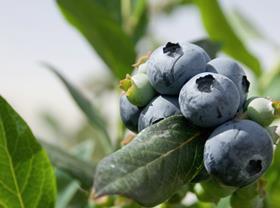
New plant breeding technology is being used by the James Hutton Institute to help blueberries thrive in the Scottish climate, the Scottish government's environment secretary Roseanna Cunningham has announced.
Part of a significant programme of Scottish government-funded research, the project aims to produce blueberry plants that are adapted to the Scottish climate, in a bid to boost local sourcing and reduce the country’s traditional reliance on blueberry imports.
The amount of blueberries grown in Scotland has increased by 10 percent in the last year – and producers are hoping the research will prove key to further growth.
Environment secretary Roseanna Cunningham said:“Blueberries are an increasingly popular fruit in the UK. They are widely considered to have health benefits and of course they count as one of the five a day for fruit and veg.
“Traditionally blueberries are imported to Scotland but this innovative research we are funding is using new technology to develop plants that are more suitable for the Scottish soil and climate as well as helping us to fully understand the health benefits of this fruit.
“Scottish blueberry production is already on the increase and this should help boost local production of this fruit – which is better for the environment and also good news for our economy.”
Dr Julie Graham, part of the James Hutton Institute's Cell and Molecular Sciences and leader of the blueberry breeding programmeadded: “Cutting-edge plant breeding technology is enabling the James Hutton Institute to develop new blueberry cultivars.
“These cultivars, better suited to Scottish conditions, should enable an increase in the home-grown blueberry crop, which will be of benefit to Scottish soft fruit growers. Long-term funding from the Scottish Government has been instrumental in supporting this research.”



